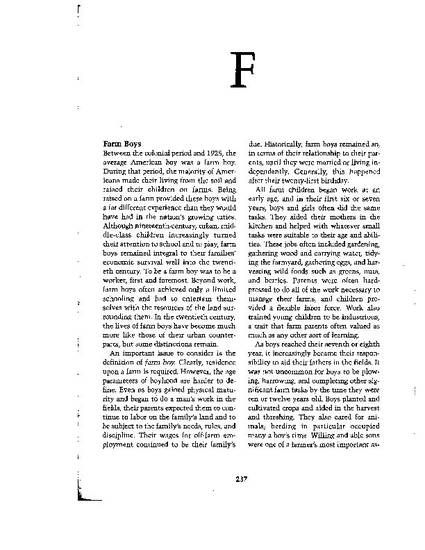
Contribution to Book
Farm Boys
Boyhood in America: An Encyclopedia
Document Type
Book Chapter
Disciplines
Publication Version
Published Version
Publication Date
1-1-2001
Abstract
Between the colonial period and 1925, the average American boy was a farm boy. During that period, the majority of Americans made their living from the soil and raised their children on farms. Being raised on a farm provided these boys with a far different experience than they would have had in the nation's growing cities. Although nineteenth-century, urban, middle- class children increasingly turned their attention to school and to play, farm boys remained integral to their families' economic survival well into the twentieth century. To be a farm boy was to be a worker, first and foremost. Beyond work, farm boys often achieved only a limited schooling and had to entertain themselves with the resources of the land surrounding them. In the twentieth century, the lives of farm boys have become much more like those of their urban counterparts, but some distinctions remain.
Copyright Owner
ABC-CLIO
Copyright Date
2001
Language
en
File Format
application/pdf
Citation Information
Pamela Riney-Kehrberg. "Farm Boys" Boyhood in America: An Encyclopedia Vol. 1 (2001) p. 237 - 241 Available at: http://works.bepress.com/pamela_riney-kehrberg/17/

Boyhood in America: An Encyclopedia edited by Priscilla Ferguson Clement and Jacqueline S. Reinier. Copyright© 2001 by Priscilla Ferguson Clement and Jacqueline S. Reinier. All rights reserved. Reproduced with permission of ABC-CLIO, LLC, Santa Barbara, CA